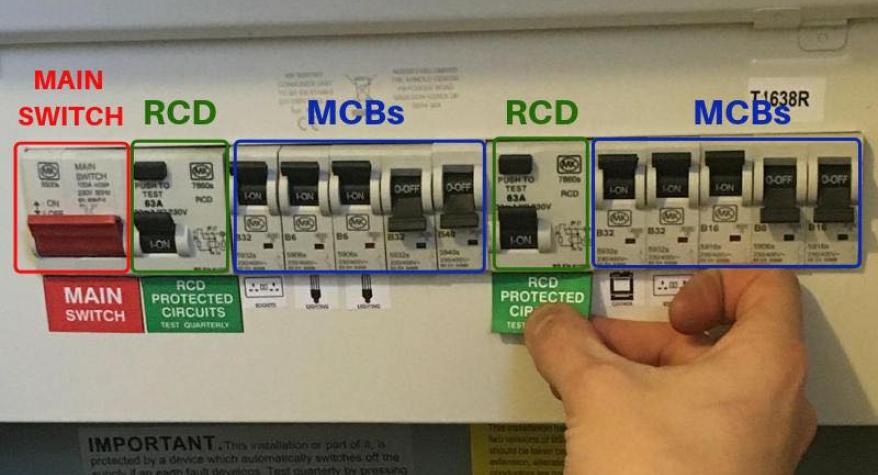Residual Current Devices (RCDs) are essential safety devices designed to protect you against electric shock and reduce the risk of electrical fires. Here’s what you need to know about RCDs for your home in Leeds.
Duravault, Leeds - What is an RCD?
What is an RCD?
• A residual current device or RCD is a safety device that quickly switches off the electricity when it detects an imbalance in the electrical circuit in your Leeds home caused by a fault or leakage of current to earth.
• It continuously monitors the flow of electricity through a circuit and automatically disconnects the power if it detects any differences from the normal current flow.
How Does an RCD Work?
• They compare the incoming and outgoing current and detect any differences which would indicate a potential fault.
• If a fault occurs, such as if you were to touch a live wire creating a path top earth, the RCD would detect this leakage of current to earth and would trip the circuit within milliseconds, cutting off the electricity supply and stopping you getting an electric shock!
Types of RCDs
• Fixed RCDs: These are installed in the fuseboard or at the distribution board and provide protection for all circuits connected to that RCD.
• Portable RCDs: These devices can be plugged into your sockets to provide temporary RCD protection for the appliance you are wanting to use.
• Socket Outlet RCDs: These devices are normal socket outlets with RCD’s built in. These devices can be a quick, cheap and easy way to protect yourself at certain socket outlets rather than adding RCD devices into your fuseboard.
Benefits of RCDs for your Leeds Home
• They prevent electric shocks by quickly disconnecting the power in the event of a fault.
• They reduce the risk of electrical fires caused by faulty appliances or wiring.
• They provide an additional layer of protection, especially in wet or hazardous environments like bathrooms and outdoor areas.
RCD Testing and Maintenance
• You should regularly test your RCDs according to the manufacturer instructions to ensure proper functionality and at regular intervals of every 6 months.
• You can test the RCDs using the built-in test button usually located on the front of the RCD device. You should also ask your local qualified electrician to carry out the test along with other RCD testing services such as RCD time test’s.
• Replace any RCDs that fail to trip or show signs of malfunction to make sure you are safe from electric shock and fire hazards.
Legal Requirements
• In the UK, it is a legal requirement for RCD’s to be installed for certain circuits in certain scenarios throughout the domestic, commercial and industrial sector.
• You must ensure you comply with the electrical safety standards of BS7671 when installing or upgrading electrical systems as there are many different types of RCD’s which have different safety applications for different scenarios.
Professional RCD Installation and Maintenance in Leeds
• RCD installations should be performed by competent, registered electricians to ensure proper wiring, connection, and functionality as there are different RCD’s for different scenarios.
• Only use qualified professionals for periodic inspections and maintenance to make sure that all safety standards are met and up to date.
By understanding the importance of RCDs and ensuring their proper installation and maintenance, you can greatly increase the electrical safety in your home or business premises. If you have any further questions or require assistance with RCD installation or maintenance, don’t hesitate to contact our experienced team of electrical experts here at Duravault, Leeds. Your safety is our top priority!



